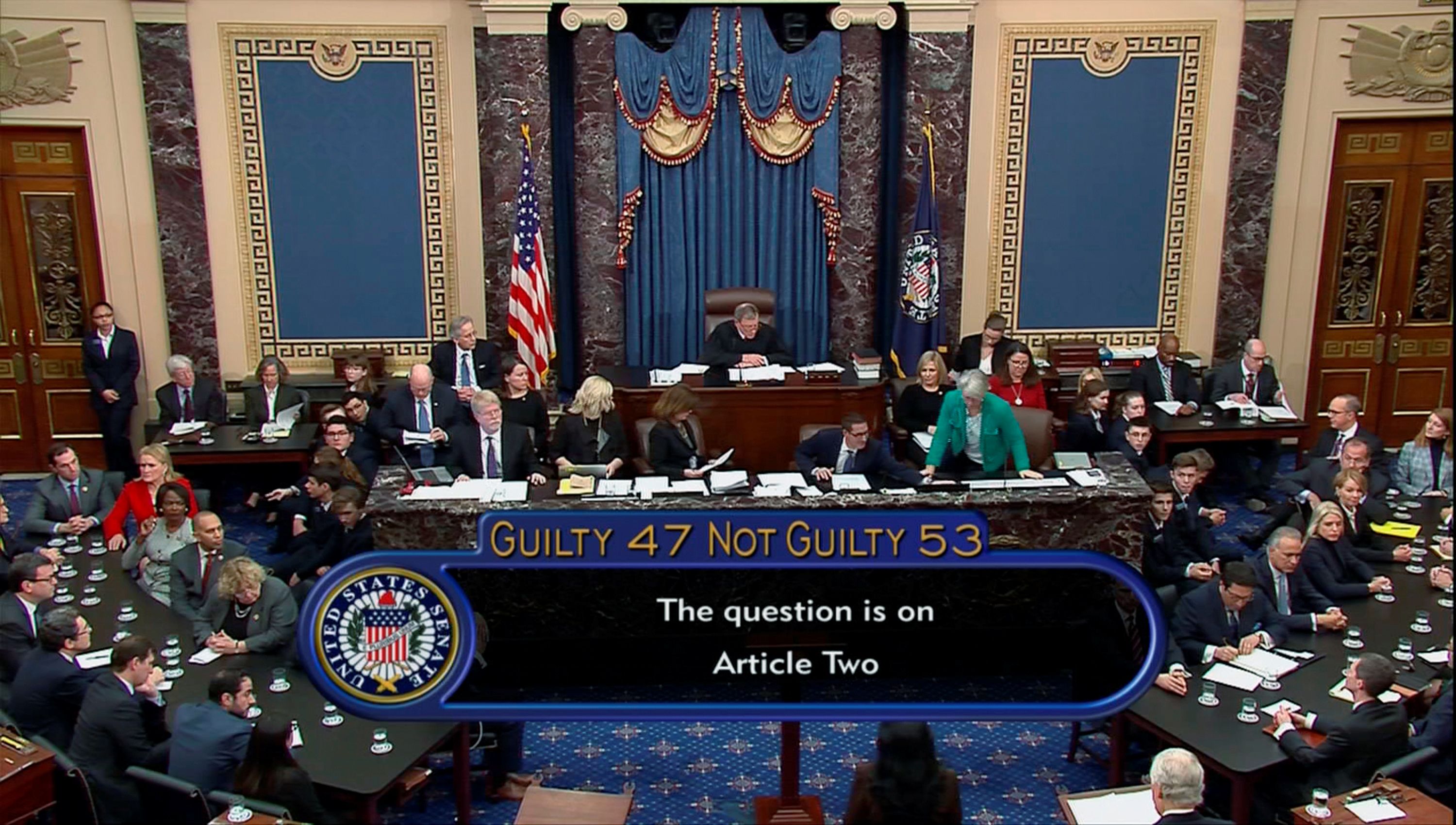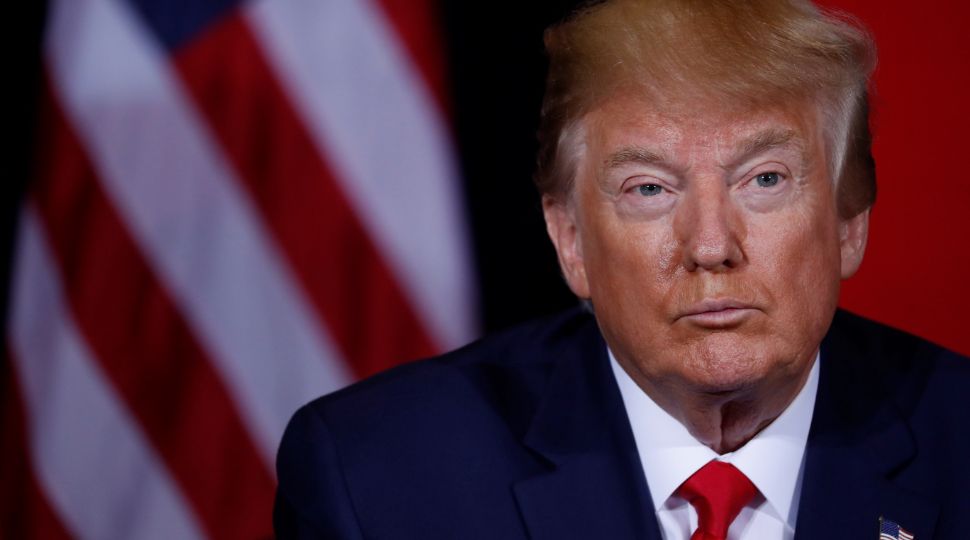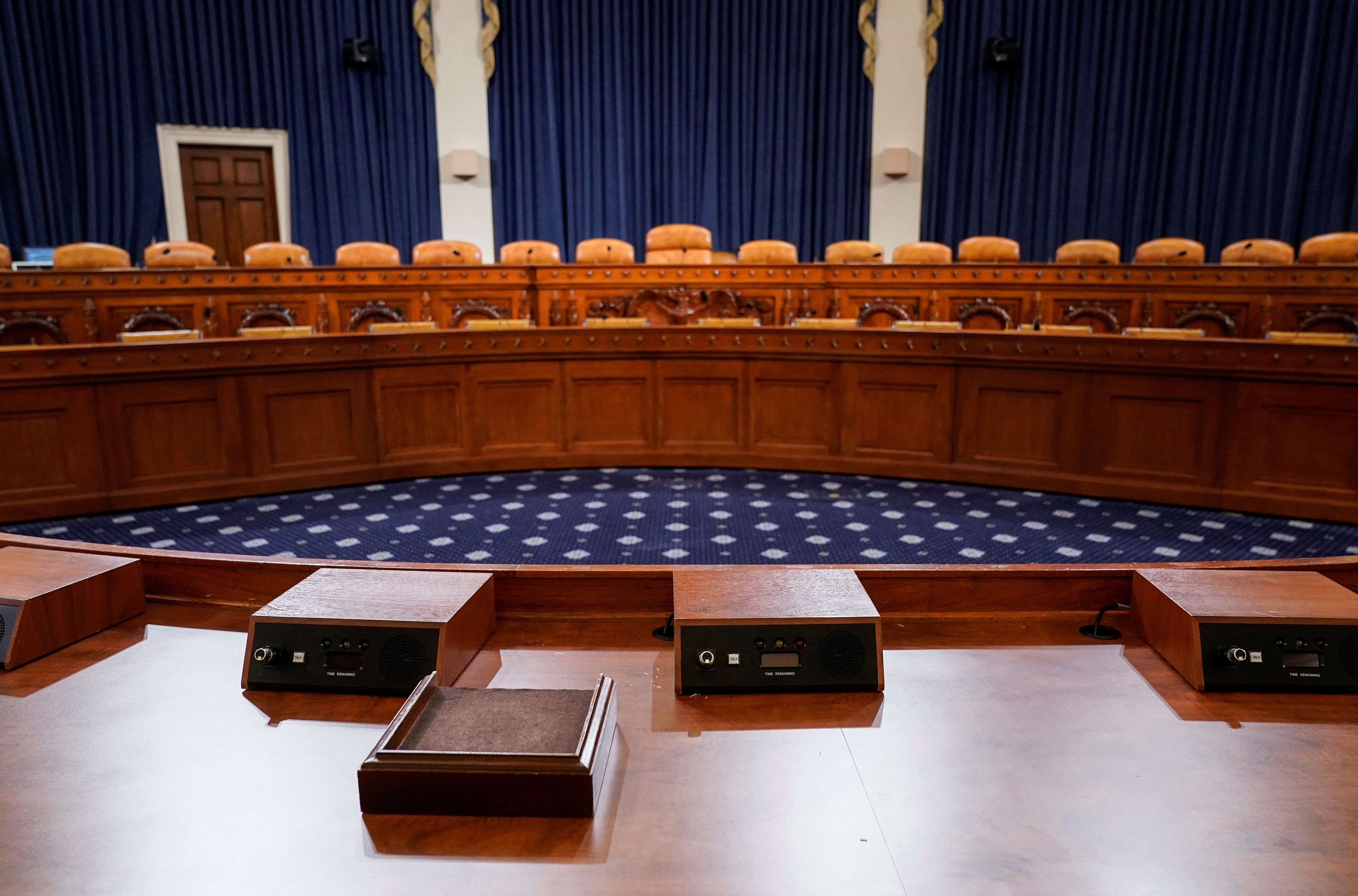Impeachment: Consequences of Acquitting Donald Trump

Impeachment and Acquittal
Trump is only the third president in U.S. history to have been impeached (Andrew Johnson in 1868; Bill Clinton in 1999). On 18 December 2019, after the completion of an investigation ongoing since September, the House of Representatives indicted Trump on two counts of alleged abuse of power: an attempt to force the President of Ukraine Volodymyr Zelensky to initiate a corruption investigation into Hunter Biden, son of former Vice President Joe Biden and Trump’s potential opponent in the presidential election, and obstruction of Congress by blocking House committee demands to submit documents and testimony by administration officials. The House sent the “Articles of Impeachment” to the Senate on 15 January, and on 22 January, a Senate trial began in which members of the higher chamber acted as the jury.
No witnesses were called to testify during the trial, which was the first time in U.S. impeachment history—all 15 Senate trials of federal officials had been held with witnesses. The call for witnesses was supported only by two Republicans—Sens. Susan Collins and Mitt Romney—and the motion was dismissed on a 49–51 vote (a simple majority was required). The Democratic House impeachment managers wanted to call former National Security Advisor John Bolton and acting White House Chief of Staff Mick Mulvaney to the Senate floor to testify. Republican senators opposed this, claiming that the House could have done so in the impeachment (indictment) stage, although the White House also went to court to block administration testimony, claiming executive and other legal privileges. On Wednesday, 5 February, on a vote of 48–52 (guilty/not guilty) and 47–53, the Senate acquitted Trump (in the first vote on abuse of power, Romney voted “guilty”). The lack of support from other Republican senators to remove Trump from office was due to their loyalty to the president and what they cited as a lack of evidence presented by the Democratic House impeachment managers.
Democrats’ Next Steps
Despite the not guilty verdict in the Senate, the House Democrats will continue to pursue issues related to the involvement of the president and his advisers in pressuring Ukraine. They may commission the Government Accountability Office to conduct another audit to departments involved in relations with Ukraine, initiate new investigations in House committees, or attempt to create a select committee. A new special counsel investigation is improbable because it requires appointment by Attorney General William Barr, who has consistently defended Trump’s actions since becoming the highest lawyer in the land in February 2019.
Democrats will especially seek testimony from former Energy Secretary Rick Perry, who resigned in December 2019. He was one of three administration representatives involved in supposedly unofficial activities controlled by Rudy Giuliani, Trump’s personal lawyer. Others—former Special Representative for Ukraine Negotiations Kurt Volker (who resigned in September when the scandal broke) and U.S. Ambassador to the EU Gordon Sondland—already have testified before the House committees. Perry ignored a subpoena. Bolton appears to have undisclosed information about the actions involving Ukraine. Media reports about his unpublished book indicate a clear link between Trump and the suspension of Congressionally approved military aid for Ukraine and the pressure for an investigation into Hunter Biden. This contradicts the president’s argument that the matters were unrelated. Bolton also allegedly states in the book that Trump, during a meeting in May 2019, commissioned him to join Giuliani’s activities to obtain information about the Bidens from the Ukrainian authorities. If true, this means Trump had started this process three months before the telephone conversation with Zelensky in July, a critical time point in the scandal. A month before the launch of the House investigation, Bolton is reported to have met Zelensky during a visit to Ukraine and a few days later participated in a bilateral meeting of the president of Ukraine and Vice President Mike Pence in Poland. The issues raised during these meetings and the possibility of involving the vice president himself in the scandal are extremely important. Bolton’s book also suggests that Secretary of State Mike Pompeo, Secretary of Defense Mark Esper, and Attorney General Barr had knowledge of Giuliani's actions. In continuing the investigations into the administration’s actions in Ukraine, the Democrats will focus not only on President Trump but also on the role of his cabinet members in the scandal. By using its subpoena power, the House will try to force Bolton to testify. It will be more difficult to call Mulvaney because he remains a member of the administration, which allows Trump to cite executive privilege to block any testimony.
Election Consequences
Impeachment had become the driving force of Trump’s re-election campaign. In the last quarter of 2019, the president’s campaign aired more than 4,500 impeachment-related advertisements, which accounted for more than 99% of all Trump spots in 2019. In the same period, the campaign and Republican National Committee raised a record $154 million and added 600,000 new donors. In a Gallup poll published on 4 February, approval for the president’s job had risen to 49% among all voters and to 94% among Republicans—Trumps’ highest rating in Gallup polls since he took office. State-by-state polls have shown increases in the president’s popularity in 31 states.
Trump has strong claims in the fight for re-election—Americans are generally positive about the U.S. situation at the moment. According to Gallup, over the past three years, satisfaction about the U.S. economy has increased from 46% to 68%, security related to terrorism from 50% to 68%, and in military strength and preparedness, from 66% to 81%. However, there has been a significant decrease in positive ratings in relation to environmental quality, from 52% to 46%, and immigration, 41% to 35%. Gallup also indicates the most important areas for voters are the economy (84%), education (83%), and healthcare (81%). Foreign policy (64%) was 12th on the list.
Conclusions and Perspectives
Impeachment and acquittal have increased Trump’s chances of re-election and will remain a key part of his campaign. Trump’s campaign staff will build a message that the Democrats have twice taken action and failed to remove the president (the first was the investigation by Special Counsel Mueller) and that no Democratic candidate can win. Likely upcoming investigations will further fuel Trump’s claims.
The Mueller inquiry, followed by the impeachment procedure, put Trump’s conduct of U.S. foreign policy at the centre of the American political debate. This partly limited the president’s ease to take on personally some foreign policy-related initiatives (e.g., relations with Russia and Iran, the dialogue with North Korea). Having been acquitted, the president may again be willing to take up these initiatives outside of official U.S. diplomacy.
Democrats have limited ability to influence Trump’s actions after his acquittal on these charges in the Senate. There is little chance of adopting laws restricting the president’s ability to conduct foreign policy because even if they pass the Republican-controlled Senate, the measures will be vetoed by Trump, which would then require a two-thirds majority in both chambers of Congress to force them through. However, while working on the budget for FY2021, the Democratic lawmakers may seek to reduce funding in areas they believe require a different policy than Trump is pursuing (especially in relations with Iran, Saudi Arabia, and the approach to nuclear policy). The success of these attempts in cases will depend on the support of Republican congressmen, who, in return, may demand concessions in other areas.
No changes in U.S. relations with Ukraine should be expected. The pillars of bilateral relations will remain the policy of not recognizing the Russian annexation of Crimea and attachment to the Minsk agreements as a political way to resolve the conflict, as well as military aid ($300 million in 2020) and development assistance (more than $100 million annually). These issues have bipartisan support in Congress.




